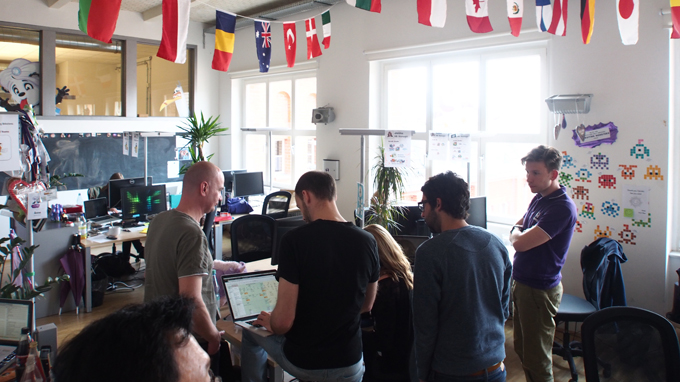Since the launch of the "Industrial Revolution 4.0" program earlier this year, Germany is seeking more ways to attract foreign workers, especially in technical fields – high-tech and information technology (IT) – to accomplish its goals.
Globalization is making Germany lose its competitive price advantage in the production of industrial products, so the country should increase the levels of service packs and high-tech solutions in its traditional industrial products that can be sold at higher prices, said Mr. Thomas Mosch - chief of the political and business department of the Federal Association for Information Technology, Telecommunications and New Media (BITKOM).
For example, Bosch Group – a leading German manufacturer of mechanical products - has bought a German IT company with around 1,000 employees to increase the research and development (R&D) capacity of their existing mechanical units. Other major German companies are making similar moves, he said.
Why 4.0?
According to German experts, three industrial revolutions have already taken place, including the industrial revolution which first began in England in the 19th century with the advent of the steam engine; the Industrial Revolution in the United States between the 19th century and early 20th century with the advent of the internal combustion engine and mass production lines; and the Internet, which is believed to represent the 3rd industrial revolution.
"Industrial Revolution 4.0" is a term that German government representatives , researchers and industry associations use to describe the way the Internet can improve the process of management, engineering, manufacturing, and logistics work across all industries, and the lives of human beings in the 21st century .
This revolution provides new solutions in industrial production organization: the connectable mechanical, warehouse and goods transport systems through the Internet.
“With this, we can make the production system more intelligent, basically self-controllable, and have the capacity of mutual coordination without any manual intervention,” said German experts.
Germany has much to learn from America - the global leader in this field.
The German Silicon Valley Accelerator program, under the management of the Ministry of Economics and Technology in Germany, allowed ten new businesses set up in San Francisco, California within a year.
This annual program, financed by public funds, is tailored to create opportunities for businesses to present business ideas on funding from international investment funds, as well as from the United States, and learn about technology and techniques from US companies.
In addition, the German Ministry of Economics and Technology has no less than 10 similar programs to support young businesses in the IT sector - high-tech, not to mention the same program under the management of the culture ministry.
Authorities in Berlin have set aside more money for R&D to serve the Industrial Revolution 4.0, and consider this the focus of the national R&D program within the next 10 years.
Headhunting solutions needed
“I wish to replace the iconic Hollywood movie superheroes of lawyers or civil offices with iconic engineers. Fewer German youths, perhaps influenced by mainstream movies from Hollywood, select engineering majors at universities. Many of them choose to study law and economics,” Mosch said in relation to the lack of capable human resources for the coming "Industrial Revolution 4.0”.
All in all, the German economy is still growing well, up 2% in 2012 , and unemployment is low, but Germany has a critical shortage of skilled manpower, especially in technical fields, said Mr. Harald Summa , CEO of the Association of the German Internet Industry .
"Historically, Germany is not a resource-rich nation, so Germany’s development is mainly based on the human brain. The problem now is that we are lacking capable brains, and we can only solve this problem by buying the best brains from abroad."
In fact, it [the shortage in talent in the technical field] has created fast moving political decisions.
"Germany has gradually expanded immigration policy for citizens outside the EU, especially for IT professionals. Even we had to declare the relevant legislation in late 2012 and early 2013," said Sebastian Blumenthal, state senator and chairman of the new media committee under the German Parliament.
“The first experts from South America and Eastern Europe have already worked in Germany, bringing their families with them. According to regulations, they will be offered working visas in Germany at a maximum period of 12 months, but then if they and the German employers want to extend the visas, government agencies are willing to consider offering long-term working visas, "said Blumenthal.
There are 7 million foreigners currently living and working in Germany.
The Germans are still boldly walking in their chosen pathway for modernization in the 21st century. The 8th IT summit will take place in December in Hamburg, with eight high-level meetings to discuss the issues of advanced technology, including the "young digital economy" program initiated by Mr. Philipp Roesler , deputy Prime Minister - Minister of Economics and Technology, in January this year.


















































